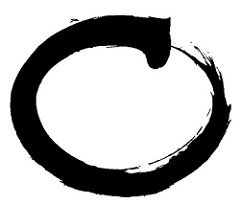“When we see beyond self, we no longer cling to happiness. And when we stop clinging, we can begin to be happy.” ~ Ajahn Chah
Ajahn Chah was born into a large and comfortable family in a rural village in North-East Thailand. He ordained as a novice in early youth and on reaching the age of twenty took higher ordination as a monk. As a young monk he studied some basic Dhamma, Discipline and scriptures. Later he practiced meditation under the guidance of several of the local Meditation Masters in the Ascetic Forest Tradition. He wandered for a number of years in the style of an ascetic monk, sleeping in forests, caves and cremation grounds, and spent a short but enlightening period with Ajahn Mun, one of the most famous and respected Thai Meditation Masters of this century.
After many years of travel and practice, he was invited to settle in a thick forest grove near the village of his birth. This grove was uninhabited, known as a place of cobras, tigers and ghosts, thus being as he said, the perfect location for a forest monk. Around Ajahn Chah a large monastery formed as more and more monks, nuns and lay-people came to hear his teachings and stay on to practice with him. Now there are disciples teaching more than forty mountain and forest branch temples throughout Thailand and in England.
Ajahn Chah’s simple yet profound style of teaching has a special appeal to Westerners, and many have come to study and practice with him, quite a few for many years. In 1975 Wat Pa Nanachat was established near Wat Pah Pong as a special training monastery for the growing numbers of Westerners interested in undertaking monastic training.
Ajahn Chah’s wonderfully simple style of teaching can be deceptive. It is often only after we have heard something many times that suddenly our minds are ripe and somehow the Teaching takes on a much deeper meaning.
In 1979 the first of several branch monasteries in Europe was established in Sussex, England by his senior Western disciples. Today there are branch monasteries in Europe, Australia, USA and New Zealand.
Ajahn Chah passed away in January, 1992 following a long illness.
 Food for the Heart
Food for the Heart
The Collected Teachings of Ajahn Chah
” The untrained mind is stupid! Sense impressions come and trick it into happiness, suffering, gladness and sorrow, but the mind’s true nature is none of those things… really this mind of ours is already unmoving and peaceful…” – from Food for the Heart by Ajahn Chah
Ajahn Chah (1919-1992) was one of Thailand’s best-known Buddhist monks. Committed to a life of simplicity and renunciation, Ajahn Chah became a monk at age nine, and lived and practised in Thailand’s caves, forests and charnal grounds as an ascetic, wandering monk. Renowned for the clarity and directness of his Dharma teachings, a network of monasteries grew up around Ajahn Chah. He attracted a large following of Western disciples, who themselves have established several branch monasteries in various parts of the world.
For more information please see www.forestsangha.org
Ajahn Chah
A madman and an enlightened person both smile, but the arahant knows why while the madman doesn’t.
All religions are like different cars all moving in the same direction. People who don’t see it have no light in their hearts.
Desires can puff us up into thinking we are something which we’re not. We must be very circumspect.
Detach, let go. Whenever there is any feeling of clinging, we detach from it because we know that feeling is just as it is.
Dhamma is in your mind, not in the forest. You don’t have to go and look anywhere else.
Do everything with a mind that lets go. Do not expect praise or reward.
If it isn’t good, let it die. If it doesn’t die, make it good.
If we let go, form is merely form, sound is sound, door is door, taste is taste, touch is touch, the heart is merely the heart.
If you have time to breathe, you have time to meditate.
If you want peace, then let it be the peace of wisdom. That’s enough!
Just know what is happening in your mind: not happy or sad about it, not attached. If you suffer, see it, know it and be empty.
Just know yourself, this is your witness. Don’t make decisions on the strength of your desires.
Know and watch your heart. It’s pure but emotions come to colour it.
Let go. Whenever there is any feeling of clinging, we detach from it because we know that very feeling is just as it is.
Let your mind be like a tightly woven net to catch emotions and feelings that come, and investigate them before you react.
Letting go a little brings a little peace. Letting go a lot brings a lot of peace. Letting go completely brings complete peace.
Only one book is worth reading, the heart.
People want to go to nibbana but when you tell them there is nothing there, they begin to have second thoughts.
Practice is like raising a duck. If it grows fast or slow, it’s the duck’s business not yours. Let go & just do your own work.
Proper effort is not the effort to make something particular happen. It is the effort to be aware and awake each moment.
Read yourself, not books. Truth isn’t outside, that’s only memory, not wisdom.
Remember you don’t meditate to get anything, but to get rid of things. We do it, not with desire, but with letting go.
The Buddha didn’t praise those who merely believe others, he praised the person who knows within himself.
The Buddha was a very wise person, he’d learned how to stop thinking.
The heart is just the heart; thoughts and feelings are just thoughts and feelings. Let things be just as they are!
This is the way it is.
Try to be mindful, and let things take their natural course. Then your mind will become still, like a clear forest pool.
We don’t meditate to see heaven. We meditate to end suffering.
What is Dhamma? Nothing isn’t.
When the heart truly understands, it lets go of everything.
